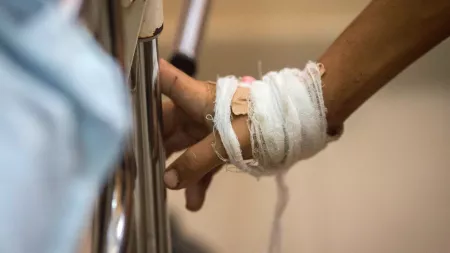30 October, 2023 – CARE International is increasingly concerned by reports it receives from the medical personnel it works with in Gaza, including that pregnant women are being forced to undergo emergency C-sections without anaesthetics.
Due to the lack of capacity in hospitals, women are being discharged within as little as three hours after giving birth. An average of 160 pregnant women are expected to give birth every day over the next month in Gaza. CARE’s latest Rapid Gender Analysis warns that the dire conditions are exacerbating the risk of maternal and newborn mortality, which are already disproportionately high in Gaza.
“I can only imagine how afraid these women are, for themselves and their babies, all while suffering in unbearable pain"said Hiba Tibi, CARE West Bank and Gaza Country Director.
"We are also hearing that some hospitals have run out of baby formula. This is particularly concerning because trauma can affect a mother’s ability to produce milk. As food supplies dwindle, there is a substantial risk to the health of the 283,000 children under five and pregnant or lactating women,” concluded Tibi.
Due to the electricity blackout, hospitals rely on fuel for their generators, but now this is running out too. There are around 130 newborn infants in incubators and these cannot operate without electricity. There are also critical shortages of clean water, drugs, blood, and other supplies. Over one-third of hospitals in Gaza and nearly two-thirds of primary health care clinics have shut down due to damage or lack of fuel.
“Over 2,000 women and 3,000 children have now reportedly been killed in Gaza. Over the weekend, there has been bombing in the vicinities of hospitals, making it even more dangerous for civilians who need to access treatment,” Ms Tibi added.
CARE International reiterates its call for an immediate ceasefire as this crisis is rapidly deteriorating into a humanitarian catastrophe. Civilians must be able to access healthcare, and the needs of women and children must be met. It is vital that humanitarian workers have safe, sustained, and unimpeded access to help people in need of assistance. All parties must abide by the rules of international humanitarian law: this includes the release of all hostages and the protection of civilians at all times.
